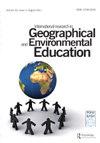终身和终身教育,为我们可持续的未来
IF 3.1
Q2 EDUCATION & EDUCATIONAL RESEARCH
International Research in Geographical and Environmental Education
Pub Date : 2022-04-03
DOI:10.1080/10382046.2022.2057895
引用次数: 0
摘要
鉴于一些国家的平均预期寿命超过80岁,今天在这些国家出生的儿童将活到二十二世纪。自然,我们想知道,我们的孩子需要什么样的技能和能力来积极贡献和创造他们可持续的未来。虽然我们无法准确预测这些技能和能力将是什么,但我们可以检查孩子们今天学到了什么。事实上,这符合通过为子孙后代提供优质教育来维持可持续性的愿望。然而,我们今世后代的学习并不局限于正规教育,而是贯穿个人的整个生命周期和环境。甚至在Banks等人(2007)题为“在不同环境中的校内外学习——终身、终身、深度”的报告发表之前,终身学习的概念就已经被讨论过了。终身学习的概念是指“在一个人的一生中,从婴儿期到成年期进行的学习。它是关于保留了什么,为什么保留了这些知识、技能和性格”(Kwek,Hung,Koh,&Tan,2017,第8页)和“一生中发生的大多数”学习都发生在非正式环境中”(Banks et al.,2007,第9页)。终身学习是指不仅发生在“学校范围内,而且发生在校外、非正式学习环境中”的学习(Kwek等人,2017,第8页)。在考虑可持续发展教育的终身和终身学习背景下需要学习什么时,我们需要考察知识、技能、行为和信念的组合。事实上,Chang、Kidman和Wi(2020)认为,可持续发展教育可以围绕Delors报告中的“学会知道”、“学会做”、“学习成为”和“学会共同生活”的理念来构建(Chang et al.,2020)。当我们在学习者的一生中以及在正式和非正式的环境中检查学习时,我们还应该检查学习的预期或非预期结果的知识、技能、态度和行为。在本期中,我们将发表一系列跨越这些维度的文章。诚然,这些文章并不代表我们上面概述的潜在范围。尽管如此,它还是一个起点,我们可以从中描述我们可以鼓励哪些其他类型的研究提交给该杂志,以围绕终身和终身教育问题展开讨论,为我们的可持续未来奠定基础。虽然我们可以主张对学前几年的可持续性知识、技能和态度的学习进行更多的研究,但我们在本期没有一篇文章来说明已经做了什么以及还可以做什么。尽管如此,我们可以将小学教育中的问题作为一个开端,同时铭记我们也可以在幼儿时期发展关于可持续性的知识和理解。关于“衡量儿童态度的挑战”的文章本文章由计算机程序翻译,如有差异,请以英文原文为准。
Life-long and life-wide education for our sustainable future
Children born in some countries today will live through the twenty-second century given the high average life expectancies exceeding 80 years in these places. Naturally, we wonder what twenty-second century skills and competencies our children will need to contribute to and create their sustainable future actively. While we cannot predict accurately what those skills and competencies will be, we can examine what children learn today. Indeed, this is aligned to the aspirations of sustaining sustainability through quality education for future generations. However, learning for our current and future generations is not limited to formal education but cuts across the individual’s entire lifespan and contexts. The notion of life-long learning has been discussed even before the report by Banks et al. (2007) titled “Learning in and out of school in diverse environments Life-long, Life-wide, Life Deep” was published. The concept of life-long learning refers to “learning that occurs across one’s lifespan, from infancy to adulthood. It is about what is retained, why such knowledge, skills and dispositions are usefully kept” (Kwek, Hung, Koh, & Tan, 2017 p. 8) and “most of the “learning that occurs across the life span takes places in informal environments” (Banks et al., 2007 p. 9). Life-wide learning refers to learning that does not just occur “within the boundaries of the school, but outside of school, in informal learning environments” (Kwek et al., 2017 p. 8). In considering what needs to be learnt in the context of life-long and life-wide learning for sustainability education, we need to examine a combination of knowledge, skills, behaviours and beliefs. Indeed, Chang, Kidman, and Wi (2020) argued that sustainability education can be framed around the Delors report’s ideas of ‘learning to know’, ‘learning to do’, ‘learning to be’ and ‘learning to live together’ (Chang et al., 2020). As we examine learning across the learner’s lifespan and within formal and informal contexts, we should also be examining the knowledge, skills, attitudes, and behaviours that are the intended or unintended outcomes of the learning. We feature a range of articles that cuts across these dimensions in this issue. Admittedly, these articles do not represent the potential range of contexts that we have outlined above. Still, it serves as a start point from which we can describe what other types of research we can encourage for submission to the journal to frame the discussion around the issue of life-long and life-wide education for our sustainable future. While we can argue for more research on the learning of sustainability knowledge, skills and attitudes in the pre-primary years, we do not have an article in this issue to illustrate what has already been done and what more can be done. Nevertheless, we can look to the issues in primary education as a start, bearing in mind that we can also develop the knowledge and understanding about sustainability in the early childhood years. The article on “The Challenge of Measuring Children’s Attitudes
求助全文
通过发布文献求助,成功后即可免费获取论文全文。
去求助
来源期刊

International Research in Geographical and Environmental Education
EDUCATION & EDUCATIONAL RESEARCH-
CiteScore
5.20
自引率
33.30%
发文量
11
期刊介绍:
International Research in Geographical & Environmental Education publishes quality research studies within the context of geographical and environmental education. The journal endeavours to promote international interest and dissemination of research in the field, provides a forum for critique, and demonstrates the relevance of research studies to good professional practice.
 求助内容:
求助内容: 应助结果提醒方式:
应助结果提醒方式:


